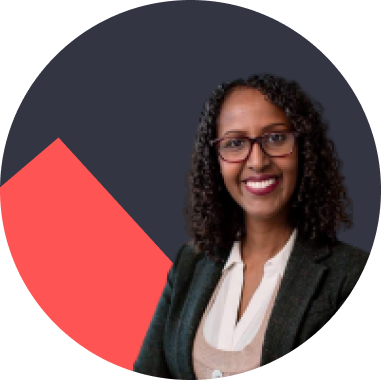From Great to Incredible with
Dr. Rahma Warsame

A Conversation with Dr. Rahma Warsame
“A mentor is so much more than the number of publications, or the method, or the medicine. It is someone who truly invests in you, and cares about you as a complete human being.”
Bio
Rahma Warsame, MD, is a Consultant in the Division of Hematology and an Assistant Professor of Medicine at Mayo Clinic. Dr. Warsame’s research focuses on amyloidosis and multiple myeloma. She is also interested in investigating existing health care delivery systems to improve patient-reported outcomes and quality of life. She is working on incorporating patient perspectives systematically and efficiently into clinical practice and determining its effect on clinical outcomes with the goal of developing a system which can provide patients with truly individualized care.
What are some life lessons you learned from your early journey into medicine?
“My family was a refugee family from Somalia,” Dr. Warsame explained, “and I think that influence of immigrating to Canada with my mother and subsequently my father, and my siblings was a very impactful experience.”
She remembers her mom and dad as being exceptionally tenacious. “Their adaptability, and deep belief in kindness really had an impact on the person I am today, to aspire for education, knowledge, and to ensure that you always pay it forward to others.”
Kindness has been a key word in Dr. Warsame’s vocabulary. As she explains, “Kindness begets kindness. I think knowledge can be acquired. Success and hard work can be taught, but a deep respect for kindness begets healing and is essential for going from a great physician to an incredible physician.”
What are some of the challenges you faced on your successful career path?
Being a black immigrant posed unique challenges for Dr. Warsame. As she explained, “I think the greatest challenges I faced was unexpected discrimination for things I could not control. So perpetually proving that I was capable and that I deserved to be in the spaces that I was.”
It is not uncommon for Dr. Warsame to be the only person of color in a room. Along with this challenge comes the responsibility to ensure that she is well received and paves the road for others.
Despite the obstacles she faced, Dr. Warsame has lived her life with a sense of confidence and in her words, “I would say that I always felt like if someone else could do it, then there’s at least a chance that I could do it.”
How do you define success?
While Dr. Warsame’s definition of success continues to evolve, the core remains. Success to her is achieving her dreams and being able to have a fulfilling career where she impacts the lives of others in a meaningful way.
Dr. Warsame lives by three L rules. Never be late, never lie, and never be lazy. “Show up and bring all of your enthusiasm, your effort, and be prepared to work hard. I always asked, ‘What did you expect of me,’ at the beginning of everything. Because I didn’t want to find out at the end what I was doing wasn’t meeting someone else’s expectations.”
To ensure she was successful, Dr. Warsame always sought feedback. “So right at the beginning I asked for expectations, and then I asked what my deficits were, and then I fixed them.”
Can you share with us some examples of mentors who have played a pivotal role in your life?
“I would say my primary mentor was Dr. Angela Dispenzieri,” Dr. Warsame explained. “When I came to Mayo Clinic, what I lacked clearly was expertise and experience in the research method, and productivity and publication. And I wanted to be a hematologist oncologist, and when I arrived, I realized that I was not comparable to my colleagues, and I needed to catch up.”
At the time, Dr. Dispenzieri was an associate professor and one of the earliest women in the division. When Dr. Warsame met with her, she told her the truth. “I don’t have any experience, but I’m hard working, so if you will guide me, I need a little hand holding, but I will make you proud.”
Dr. Dispenzieri replied, “Okay. I expect you to meet your deadlines, and to tell me when you don’t understand.” Dr. Warsame agreed and that was the beginning of a friendship.
“We started as simply researchers where she taught me how to be a successful researcher. But she taught me how to be a great hematologist. She taught me about time management. She taught me about critically appraising when to say yes, and how to say no.” To this day, their friendship is strong, with Dr. Dispenzieri attending Dr. Warsame’s wedding and even volunteering to house her for a few days when she was preparing to have a baby.
And as Dr. Warsame’s notes, “It just goes to show how a relationship can evolve and grow!”
What is one thing you wish you knew when you started medical school?
Here, Dr. Warsame regrets not taking a larger interest in statistics. She explains, “That seems odd, and I don’t mean it just for research. To critically appraise the literature, to understand the odds, the ratios, to discuss prognosis. Because essentially so much of medicine is the relative risk, the absolute risk, the positive predictive value of a test, the prevalence, the specificity, the sensitivity. I think that’s what I wish I would have invested a little more.”
As she continued to explain, “I help people make decisions about life or death, about money, about treatments based on relative risk, odds, ratios, hazard ratios, explaining that and coupling that with their own core values and qualities. And that was not on my radar. And I think a legitimately deep foundational understanding of statistics is incredibly helpful. If I could go back in time, I would have taken every statistics class.”
Pearls of Wisdom
- Kindness begets kindness. And kindness is what helps you transition from greatness to excellence.
- Never be late, never lie, and never be lazy..
- Mid-cycle feedback is essential for mentorship. Don’t wait for the evaluation to come to you. Constantly asking yourself and others what you can do to improve is the engine of growth.
